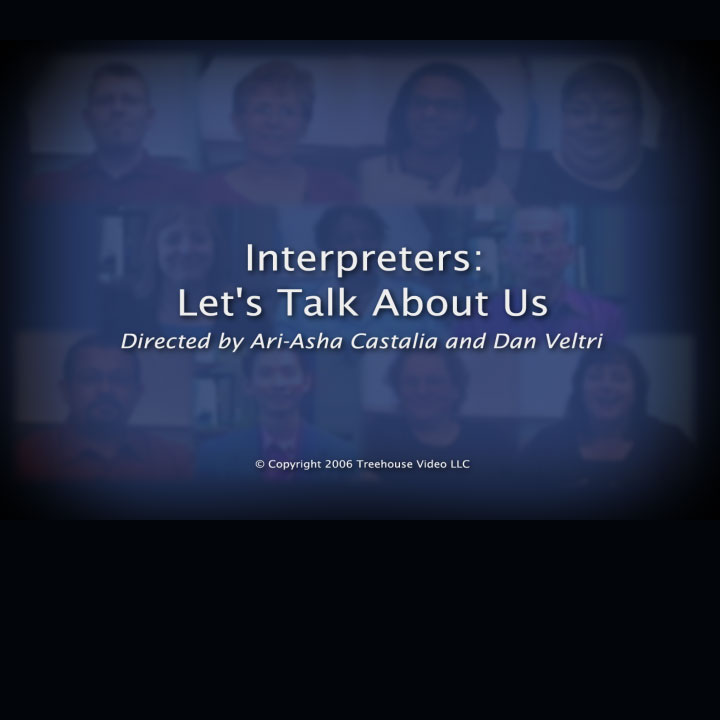Interpreters: Let’s Talk About Us
$59.95
This is an online program.
After purchase, log in and go to “My Programs” at the top menu, then click on the “Interpreters: Let’s Talk About Us” title to view the program.
 Scroll down to view important information about using this program to earn CEUs.
Scroll down to view important information about using this program to earn CEUs.
Description
by Ari-Asha Castalia and Dan Veltri
This program features eleven interpreters discussing ethical issues. Scroll down to view more details about the program.
CERTIFIED/LICENSED INTERPRETERS: You may earn 0.8 Professional Studies CEUs by spending at least 8 hours with the material, viewing the entire program and completing a set of study questions.
The program is offered at the Little/None Content Knowledge Level.
TERMS OF SERVICE
Please note, when you place the program in your shopping cart and check out, you will be asked to agree to the Terms of Service, including the following:
I certify that this activity represents a valid and verifiable Continuing Education Experience that exceeds routine employment responsibilities.
LEARNING OBJECTIVES
– users will view 8 video scenarios in which interpreters face ethical challenges
– users will analyze two of those scenarios in depth
– users will explain their analysis in their answers to a total of 8 questions regarding the two scenarios
– users will compare and contrast their reactions to the scenarios to the reactions of the filmed participants
Please note: There is an additional $15.00 fee for CEU processing. Do not pay this fee until AFTER you have completed and submitted the Discussion Questions.
Click here for CEU Processing information.
ISBN: 1-932501-75-4
Price: $59.95
View a short clip from the program. Click on the lower right to view full screen.
In December, 2005, Ari-Asha Castalia and Dan Veltri, both interpreters and workshop presenters from San Francisco, had a conversation about the need for an honest dialogue among professional interpreters about the work we do. Beyond the linguistic skills and knowledge involved, and beyond the surface readings of the old Code of Ethics and the new Code of Professional Conduct, they saw a need for an opportunity to discuss subtle issues that sometimes cause conflict among interpreters and between interpreters and the consumers they serve.
Ari and Dan decided to bring together eleven certified interpreters from diverse backgrounds, seeking a blend of interpreters of all colors, men and women, hearing and Deaf, seasoned and newer interpreters, codas and non-codas. Freelance community interpreters, educational interpreters and those who work primarily for video relay services were all invited to participate in the project.
The participants were brought to a private home in Sacramento, California for a weekend in May, 2006. They were divided into discussion groups and provided topics with an illustrative scenario to discuss. Participants were not given the scenario until just prior to the cameras rolling, to capture their immediate reactions. Groups were free to take the topic in whatever direction they saw fit. With one camera focused on each participant, the entire discussion was captured. Later each session was edited.
The scenarios invited discussion on the following topics:
Support while working (both asked for and not)
VRS and teaming within VRS settings
Clarifying motivation for interpreting choices: message clarity vs. “saving face”
Handling concerns about each other’s business practices
Managing feelings of ownership of the process and content
Managing disparity of skills amongst team members
The Deaf participants had an additional discussion on these topics:
Working with interpreters who over-manage the situation
Responding to the interpreter’s demeanor
Working with interpreters for the first time
Cultural mediation vs. boundary crossing for CDIs
The program is divided into eight sessions. Some of the sessions are conducted in ASL and some are in spoken English. The sessions conducted in ASL may be viewed with or without captions. Click the CC button in the lower right of the screen to turn captions on or off. For sessions in spoken English, captions are permanently displayed.
Do you need additional accommodations in order to use this program? Select Contact in the top menu to make your request.
Suggestions for using this program:
To use in a group setting we suggest first printing the “Instructions for Interpreters” file on the main menu page. This files contains the scenarios so group members can read the material prior to viewing. Then view the sessions, and lead a discussion, using the questions found in the document. Feel free to add questions of your own.
For individual use we suggest reading the scenario on screen. Then view the sessions. After watching, print the “Instructions for Interpreters” file and answer the discussion questions. To earn CEUs, follow the instructions to complete and submit your paperwork, purchase the CEU processing and complete the evaluation.

